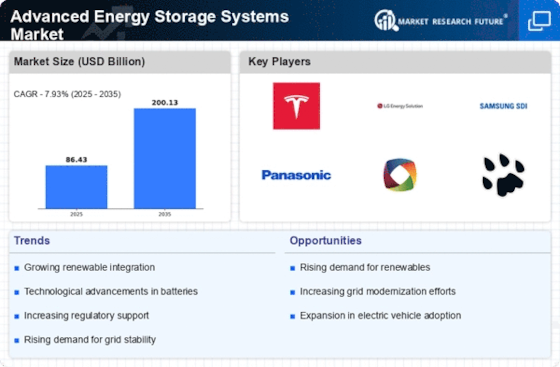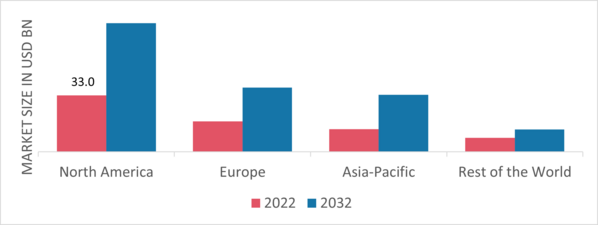-
EXECUTIVE SUMMARY
-
SCOPE OF THE REPORT
-
MARKET DEFINITION
-
SCOPE OF THE STUDY
- DEFINITION
- RESEARCH OBJECTIVE
- ASSUMPTIONS
- LIMITATIONS
-
RESEARCH PROCESS
- PRIMARY RESEARCH
- SECONDARY RESEARCH
-
MARKET SIZE ESTIMATION
-
FORECAST MODEL
-
MARKET LANDSCAPE
-
PORTER’S FIVE FORCES ANALYSIS
- THREAT OF NEW ENTRANTS
- BARGAINING POWER OF BUYERS
- THREAT OF SUBSTITUTES
- SEGMENT RIVALRY
- BARGAINING POWER OF BUYERS
-
VALUE CHAIN/SUPPLY CHAIN ANALYSIS
-
MARKET DYNAMICS
-
INTRODUCTION
-
MARKET DRIVERS
-
MARKET RESTRAINTS
-
MARKET OPPORTUNITIES
-
MARKET TRENDS
-
GLOBAL ADVANCED ENERGY STORAGE SYSTEMS MARKET, BY TECHNOLOGY
-
INTRODUCTION
-
MECHANICAL
- MARKET ESTIMATES & FORECAST, 2023–2032
- MARKET ESTIMATES & FORECAST BY REGION, 2023–2032
-
THERMAL
- MARKET ESTIMATES & FORECAST, 2023–2032
- MARKET ESTIMATES & FORECAST BY REGION, 2023–2032
-
ELECTRO CHEMICAL
- MARKET ESTIMATES & FORECAST, 2023–2032
- MARKET ESTIMATES & FORECAST BY REGION, 2023–2032
-
OTHERS
- MARKET ESTIMATES & FORECAST, 2023–2032
- MARKET ESTIMATES & FORECAST BY REGION, 2023–2032
-
GLOBAL ADVANCED ENERGY STORAGE SYSTEMS MARKET, BY STORAGE TYPE
-
INTRODUCTION
-
BATTERIES
- MARKET ESTIMATES & FORECAST, 2023–2032
- MARKET ESTIMATES & FORECAST BY REGION, 2023–2032
-
FLYWHEELS
- MARKET ESTIMATES & FORECAST, 2023–2032
- MARKET ESTIMATES & FORECAST BY REGION, 2023–2032
-
COMPRESSED AIR STORAGE
- MARKET ESTIMATES & FORECAST, 2023–2032
- MARKET ESTIMATES & FORECAST BY REGION, 2023–2032
-
PUMPED HYDRO-POWER
- MARKET ESTIMATES & FORECAST, 2023–2032
- MARKET ESTIMATES & FORECAST BY REGION, 2023–2032
-
OTHERS
- MARKET ESTIMATES & FORECAST, 2023–2032
- MARKET ESTIMATES & FORECAST BY REGION, 2023–2032
-
GLOBAL ADVANCED ENERGY STORAGE SYSTEMS MARKET, BY APPLICATION
-
INTRODUCTION
-
TRANSPORTATION
- MARKET ESTIMATES & FORECAST, 2023–2032
- MARKET ESTIMATES & FORECAST BY REGION, 2023–2032
-
GRID STORAGE
- MARKET ESTIMATES & FORECAST, 2023–2032
- MARKET ESTIMATES & FORECAST BY REGION, 2023–2032
-
OTHERS
- MARKET ESTIMATES & FORECAST, 2023–2032
- MARKET ESTIMATES & FORECAST BY REGION, 2023–2032
-
GLOBAL ADVANCED ENERGY STORAGE SYSTEMS MARKET, BY REGION
-
INTRODUCTION
-
NORTH AMERICA
- MARKET ESTIMATES & FORECAST, 2023–2032
- MARKET ESTIMATES & FORECAST BY TECHNOLOGY, 2023–2032
- MARKET ESTIMATES & FORECAST BY STORAGE TYPE, 2023–2032
- MARKET ESTIMATES & FORECAST BY APPLICATION, 2023–2032
- US
- CANADA
-
EUROPE
- MARKET ESTIMATES & FORECAST, 2023–2032
- MARKET ESTIMATES & FORECAST BY TECHNOLOGY, 2023–2032
- MARKET ESTIMATES & FORECAST BY STORAGE TYPE, 2023–2032
- MARKET ESTIMATES & FORECAST BY APPLICATION, 2023–2032
- GERMANY
- SWITZERLAND
- UK
- PORTUGAL
- REST OF EUROPE
-
ASIA-PACIFIC
- MARKET ESTIMATES & FORECAST, 2023–2032
- MARKET ESTIMATES & FORECAST BY TECHNOLOGY, 2023–2032
- MARKET ESTIMATES & FORECAST BY STORAGE TYPE, 2023–2032
- MARKET ESTIMATES & FORECAST BY APPLICATION, 2023–2032
- CHINA
- JAPAN
- INDIA
- SOUTH KOREA
- REST OF ASIA-PACIFIC
-
REST OF THE WORLD
- MARKET ESTIMATES & FORECAST, 2023–2032
- MARKET ESTIMATES & FORECAST BY TECHNOLOGY, 2023–2032
- MARKET ESTIMATES & FORECAST BY STORAGE TYPE, 2023–2032
- MARKET ESTIMATES & FORECAST BY APPLICATION, 2023–2032
- MIDDLE EAST
- AFRICA
- LATIN AMERICA
-
COMPETITIVE LANDSCAPE
-
COMPANY PROFILE
-
The AES Corporation (US)
- COMPANY OVERVIEW
- PRODUCTS/SERVICES OFFERING
- FINANCIAL OVERVIEW
- KEY DEVELOPMENTS
- STRATEGY
- SWOT ANALYSIS
-
Tesla, Inc. (US)
- COMPANY OVERVIEW
- PRODUCTS/SERVICES OFFERING
- FINANCIAL OVERVIEW
- KEY DEVELOPMENTS
- STRATEGY
- SWOT ANALYSIS
-
GENERAL ELECTRIC (US)
- COMPANY OVERVIEW
- PRODUCTS/SERVICES OFFERING
- FINANCIAL OVERVIEW
- KEY DEVELOPMENTS
- STRATEGY
- SWOT ANALYSIS
-
ABB (Switzerland)
- COMPANY OVERVIEW
- PRODUCTS/SERVICES OFFERING
- FINANCIAL OVERVIEW
- KEY DEVELOPMENTS
- STRATEGY
- SWOT ANALYSIS]
-
Saft (France)
- COMPANY OVERVIEW
- PRODUCTS/SERVICES OFFERING
- FINANCIAL OVERVIEW
- KEY DEVELOPMENTS
- STRATEGY
- SWOT ANALYSIS
-
LG Chem. (South Korea)
- COMPANY OVERVIEW
- PRODUCTS/SERVICES OFFERING
- FINANCIAL OVERVIEW
- KEY DEVELOPMENTS
- STRATEGY
- SWOT ANALYSIS
-
Siemens AG (Germany)
- COMPANY OVERVIEW
- PRODUCTS/SERVICES OFFERING
- FINANCIAL OVERVIEW
- KEY DEVELOPMENTS
- STRATEGY
- SWOT ANALYSIS
-
Panasonic Corporation (Japan)
- COMPANY OVERVIEW
- PRODUCTS/SERVICES OFFERING
- FINANCIAL OVERVIEW
- KEY DEVELOPMENTS
- STRATEGY
- SWOT ANALYSIS
-
Electrovaya (Canada)
- COMPANY OVERVIEW
- PRODUCTS/SERVICES OFFERING
- FINANCIAL OVERVIEW
- KEY DEVELOPMENTS
- STRATEGY
- SWOT ANALYSIS
-
Hitachi, Ltd. (Japan)
- COMPANY OVERVIEW
- PRODUCTS/SERVICES OFFERING
- FINANCIAL OVERVIEW
- KEY DEVELOPMENTS
- STRATEGY
- SWOT ANALYSIS
-
LIST OF TABLES
-
GLOBAL ADVANCED ENERGY STORAGE SYSTEMS MARKET: BY REGION, 2023–2032
-
NORTH AMERICA: ADVANCED ENERGY STORAGE SYSTEMS MARKET: BY COUNTRY, 2023–2032
-
EUROPE ADVANCED ENERGY STORAGE SYSTEMS MARKET: BY COUNTRY, 2023–2032
-
ASIA-PACIFIC ADVANCED ENERGY STORAGE SYSTEMS MARKET: BY COUNTRY, 2023–2032
-
ROW ADVANCED ENERGY STORAGE SYSTEMS MARKET: BY COUNTRY, 2023–2032
-
GLOBAL ADVANCED ENERGY STORAGE SYSTEMS MARKET, BY TECHNOLOGY, BY REGIONS, 2023–2032
-
NORTH AMERICA: ADVANCED ENERGY STORAGE SYSTEMS MARKET, BY TECHNOLOGY, BY COUNTRY, 2023–2032
-
EUROPE ADVANCED ENERGY STORAGE SYSTEMS MARKET, BY TECHNOLOGY, BY COUNTRY, 2023–2032
-
ASIA-PACIFIC ADVANCED ENERGY STORAGE SYSTEMS MARKET BY TECHNOLOGY, BY COUNTRY, 2023–2032
-
ROW ADVANCED ENERGY STORAGE SYSTEMS MARKET BY TECHNOLOGY, BY COUNTRY, 2023–2032
-
GLOBAL ADVANCED ENERGY STORAGE SYSTEMS MARKET BY STORAGE TYPE: BY REGIONS, 2023–2032
-
NORTH AMERICA: ADVANCED ENERGY STORAGE SYSTEMS MARKET BY STORAGE TYPE: BY COUNTRY, 2023–2032
-
EUROPE ADVANCED ENERGY STORAGE SYSTEMS MARKET BY STORAGE TYPE: BY COUNTRY, 2023–2032
-
ASIA-PACIFIC ADVANCED ENERGY STORAGE SYSTEMS MARKET BY STORAGE TYPE: BY COUNTRY, 2023–2032
-
ROW ADVANCED ENERGY STORAGE SYSTEMS MARKET BY STORAGE TYPE: BY COUNTRY, 2023–2032
-
GLOBAL ADVANCED ENERGY STORAGE SYSTEMS MARKET BY APPLICATION: BY REGIONS, 2023–2032
-
NORTH AMERICA: ADVANCED ENERGY STORAGE SYSTEMS MARKET BY APPLICATION: BY COUNTRY, 2023–2032
-
EUROPE ADVANCED ENERGY STORAGE SYSTEMS MARKET BY APPLICATION: BY COUNTRY, 2023–2032
-
ASIA-PACIFIC ADVANCED ENERGY STORAGE SYSTEMS MARKET BY APPLICATION: BY COUNTRY, 2023–2032
-
ROW ADVANCED ENERGY STORAGE SYSTEMS MARKET BY APPLICATION: BY COUNTRY, 2023–2032
-
GLOBAL ADVANCED ENERGY STORAGE SYSTEMS MARKET: BY REGION, 2023–2032
-
GLOBAL ADVANCED ENERGY STORAGE SYSTEMS MARKET: BY TECHNOLOGY, 2023–2032
-
GLOBAL ADVANCED ENERGY STORAGE SYSTEMS MARKET: BY STORAGE TYPE, 2023–2032
-
GLOBAL ADVANCED ENERGY STORAGE SYSTEMS MARKET: BY APPLICATION, 2023–2032
-
NORTH AMERICA: ADVANCED ENERGY STORAGE SYSTEMS MARKET, BY COUNTRY
-
NORTH AMERICA: ADVANCED ENERGY STORAGE SYSTEMS MARKET, BY TECHNOLOGY
-
NORTH AMERICA: ADVANCED ENERGY STORAGE SYSTEMS MARKET, BY STORAGE TYPE
-
NORTH AMERICA: ADVANCED ENERGY STORAGE SYSTEMS MARKET, BY APPLICATION
-
EUROPE: ADVANCED ENERGY STORAGE SYSTEMS MARKET, BY COUNTRY
-
EUROPE: ADVANCED ENERGY STORAGE SYSTEMS MARKET, BY TECHNOLOGY
-
EUROPE: ADVANCED ENERGY STORAGE SYSTEMS MARKET, BY STORAGE TYPE
-
EUROPE: ADVANCED ENERGY STORAGE SYSTEMS MARKET, BY APPLICATION
-
ASIA-PACIFIC: ADVANCED ENERGY STORAGE SYSTEMS MARKET, BY COUNTRY
-
ASIA-PACIFIC: ADVANCED ENERGY STORAGE SYSTEMS MARKET, BY TECHNOLOGY
-
ASIA-PACIFIC: ADVANCED ENERGY STORAGE SYSTEMS MARKET, BY STORAGE TYPE
-
ASIA-PACIFIC: ADVANCED ENERGY STORAGE SYSTEMS MARKET, BY APPLICATION
-
ROW: ADVANCED ENERGY STORAGE SYSTEMS MARKET, BY REGION
-
ROW ADVANCED ENERGY STORAGE SYSTEMS MARKET, BY TECHNOLOGY
-
ROW ADVANCED ENERGY STORAGE SYSTEMS MARKET, BY STORAGE TYPE
-
ROW ADVANCED ENERGY STORAGE SYSTEMS MARKET, BY APPLICATION
-
LIST OF FIGURES
-
RESEARCH PROCESS OF MRFR
-
TOP-DOWN & BOTTOM-UP APPROACH
-
MARKET DYNAMICS
-
IMPACT ANALYSIS: MARKET DRIVERS
-
IMPACT ANALYSIS: MARKET RESTRAINTS
-
PORTER''S FIVE FORCES ANALYSIS
-
VALUE CHAIN ANALYSIS
-
GLOBAL ADVANCED ENERGY STORAGE SYSTEMS MARKET SHARE, BY TECHNOLOGY, 2023 (%)
-
GLOBAL ADVANCED ENERGY STORAGE SYSTEMS MARKET, BY TECHNOLOGY, 2023–2032 (USD MILLION)
-
GLOBAL ADVANCED ENERGY STORAGE SYSTEMS MARKET SHARE, BY STORAGE TYPE, 2023 (%)
-
GLOBAL ADVANCED ENERGY STORAGE SYSTEMS MARKET, BY STORAGE TYPE, 2023–2032 (USD MILLION)
-
GLOBAL ADVANCED ENERGY STORAGE SYSTEMS MARKET SHARE, BY APPLICATION, 2023 (%)
-
GLOBAL ADVANCED ENERGY STORAGE SYSTEMS MARKET, BY APPLICATION, 2023–2032 (USD MILLION)
-
GLOBAL ADVANCED ENERGY STORAGE SYSTEMS MARKET SHARE (%), BY REGION, 2023
-
GLOBAL ADVANCED ENERGY STORAGE SYSTEMS MARKET, BY REGION, 2023–2032 (USD MILLION)
-
NORTH AMERICA: ADVANCED ENERGY STORAGE SYSTEMS MARKET SHARE (%), 2023
-
NORTH AMERICA: ADVANCED ENERGY STORAGE SYSTEMS MARKET BY COUNTRY, 2023–2032 (USD MILLION)
-
EUROPE ADVANCED ENERGY STORAGE SYSTEMS MARKET SHARE (%), 2023
-
EUROPE ADVANCED ENERGY STORAGE SYSTEMS MARKET BY COUNTRY, 2023–2032 (USD MILLION)
-
ASIA-PACIFIC ADVANCED ENERGY STORAGE SYSTEMS MARKET SHARE (%), 2023
-
ASIA-PACIFIC ADVANCED ENERGY STORAGE SYSTEMS MARKET BY COUNTRY, 2023–2032 (USD MILLION)
-
REST OF THE WORLD ADVANCED ENERGY STORAGE SYSTEMS MARKET SHARE (%), 2023
-
REST OF THE WORLD ADVANCED ENERGY STORAGE SYSTEMS MARKET BY COUNTRY, 2023–2032 (USD MILLION)









Leave a Comment